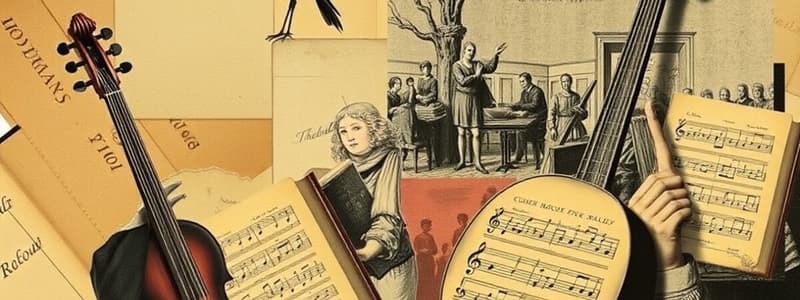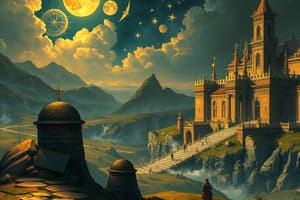Podcast
Questions and Answers
Which of the following is a defining characteristic of the Baroque period in music?
Which of the following is a defining characteristic of the Baroque period in music?
- The complex interweaving of melodies typical of medieval music
- The development of polyphonic music with interweaving melodic lines
- The exclusive use of sacred choral music
- The rise of opera and the use of monody (correct)
What significant change in instrumentation occurred during the Baroque era?
What significant change in instrumentation occurred during the Baroque era?
- A decrease in the use of orchestras
- A significant increase in the use of orchestras (correct)
- The exclusive use of keyboard instruments like the harpsichord
- The invention of electronic instruments
How did vocal music evolve during the Baroque period compared to the Medieval and Renaissance periods?
How did vocal music evolve during the Baroque period compared to the Medieval and Renaissance periods?
- It became less dramatic and expressive
- It became more dramatic and expressive (correct)
- It shifted towards simpler melodies with less emphasis on harmony
- It maintained the complex interweaving of melodies
Who is considered a key composer who significantly influenced the Baroque style, particularly in opera?
Who is considered a key composer who significantly influenced the Baroque style, particularly in opera?
What was a popular keyboard instrument during the Baroque period?
What was a popular keyboard instrument during the Baroque period?
When did the Baroque period in music take place?
When did the Baroque period in music take place?
What innovation by Guido d'Arezzo revolutionized music notation?
What innovation by Guido d'Arezzo revolutionized music notation?
Which musical form emerged during the Renaissance period?
Which musical form emerged during the Renaissance period?
What characterized polyphonic music?
What characterized polyphonic music?
What role did polyphony play in sacred music?
What role did polyphony play in sacred music?
Flashcards
Baroque Music
Baroque Music
A musical period from 1600 to 1750 characterized by dramatic expression and complex compositions.
Rise of Opera
Rise of Opera
The emergence of opera as a musical genre during the Baroque period.
Orchestral Growth
Orchestral Growth
Increase in the use and complexity of orchestras in instrumental music during the Baroque era.
Polyphony
Polyphony
Signup and view all the flashcards
Guido d'Arezzo
Guido d'Arezzo
Signup and view all the flashcards
Sacred Choral Music
Sacred Choral Music
Signup and view all the flashcards
Monteverdi
Monteverdi
Signup and view all the flashcards
Monody
Monody
Signup and view all the flashcards
Harpsichord
Harpsichord
Signup and view all the flashcards
Violins and Sackbuts
Violins and Sackbuts
Signup and view all the flashcards
Study Notes
Baroque Music (1600-1750)
- A period of significant musical development in Europe
- Marked by the birth of opera and growth of the orchestra
- A move away from the complex style of medieval and Renaissance music
- Vocal music became more dramatic
Medieval and Renaissance Music (6th-15th Centuries)
- Early church music evolved from plainchant to multiple voice parts
- Introduction of several voice parts
- Use of the organ to create harmonies
- Rise of instrumental music, including viols, sackbuts, and recorders
- Development of polyphony; pieces with multiple interweaving melodic lines sung by different voices.
- Famous composers such as Léonin, Pérotin, Dufay, Josquin, Palestrina, and Orlande de Lassus
Music Staff
- Guido d'Arezzo's creation of the music staff in around 1030
- Allowed for written music to be read and written easily
- The use of lines and spaces to represent notes
Music in the Renaissance (Mid-15th Century)
- Cultural changes in Europe, including growth in trade and music
- Wealthy families and musicians played music in various social settings
- Printing made music more accessible
Vocal Music
- Madrigals: popular non-religious songs
- Word painting: musical technique mimicking text meaning
- Opera: Italian dramatic music, first appeared in the 17th Century
- Basso continuo: accompaniment of instrumental chords played under the melody
Instrumental Music
- Many instruments (such as viols, sackbuts, recorders) developed or were improved during the Renaissance
- Keyboard instruments: virginals and harpsichords became popular
Choral Sacred Music
- Polyphony: style using multiple voice parts
- Motets: pieces with different vocals and words merged with plainchant
- Masses: complex musical settings in Catholic services; elaborate musical compositions
- Anthems: less complex pieces in Protestant services
Key Composers
- Claudio Monteverdi: important Italian composer of the Baroque period, influential in developing opera.
Studying That Suits You
Use AI to generate personalized quizzes and flashcards to suit your learning preferences.




